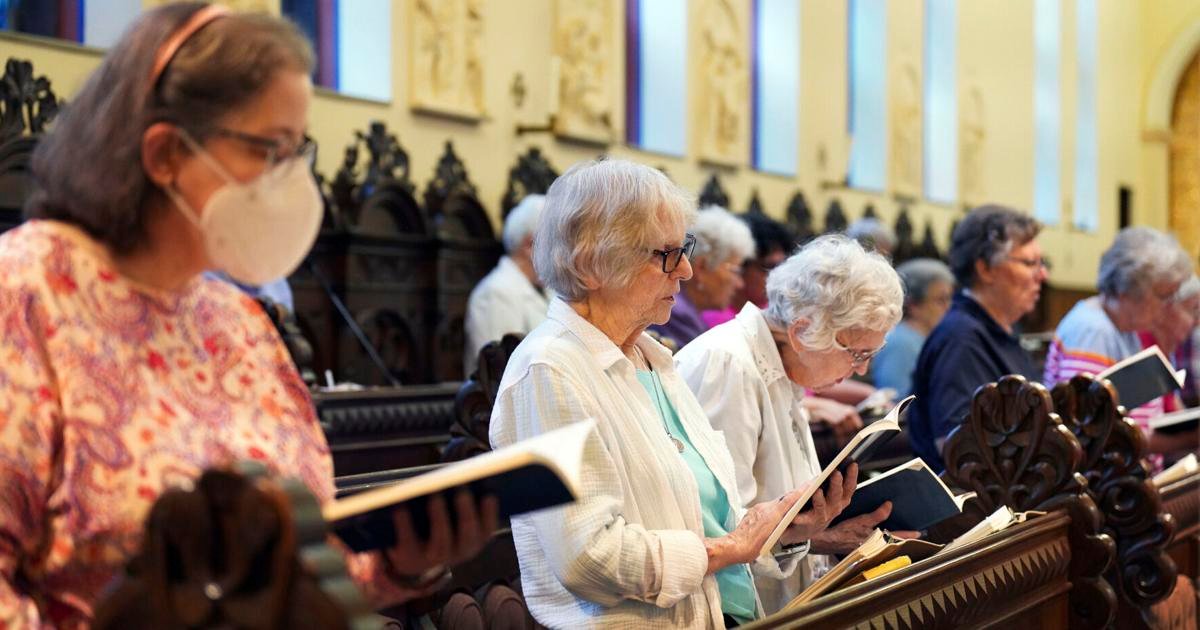ATCHISON, Kansas — Among corporate America’s most persistent shareholder activists are 80 nuns in a monastery outside Kansas City.
Nestled in rolling farmland, the Benedictine sisters of Mount St. Scholastica took on the likes of Google, Target and Citigroup — calling on major companies to do everything from artificial-intelligence oversight to measuring pesticides to respecting the rights of Indigenous people.
“Some of these companies, they just really hate us,” said Sister Barbara McCracken, who leads the nuns’ corporate responsibility program. “Because we’re small, we’re just like a little fly in the ointment trying to irritate them.”

Benedictine sisters, Rose Marie Stallbaumer, left, and Barbara McCracken, right, look through corporate resolution archives and newspaper clippings July 16 at the Mount St. Scholastica monastery in Atchison, Kan. The community participates in activist investing, a process in which they partner with other religious organizations to buy the stocks of companies they hope to influence.
The nuns are no strangers to making a statement. Recently they went viral for denouncing the commencement speech of Kansas City Chiefs kicker Harrison Butker at the nearby college they co-founded.
People are also reading…
When Butker suggested the women graduates of Benedictine College would most cherish their roles as wives and mothers, the nuns expressed concern with “the assertion that being a homemaker is the highest calling for a woman.”
After all, women’s education has been a mainstay of their community, which founded dozens of schools. Many of the sisters have doctorates. Most worked professional jobs — their ranks include a physician, a canon lawyer and a concert violinist — and they have always shared what they earned.
They invest what little they have in corporations that match their religious ideals but also keep a bit in some that don’t, so they can push those companies to change policies they view as harmful.
When many companies gather for annual meetings with their shareholders, the nuns propose resolutions based on stock they own, some in amounts as little as $2,000.

Benedictine sisters join in song during evening prayer July 16 at the Mount St. Scholastica monastery in Atchison, Kan.
The sisters asked Chevron to assess its human rights policies, and for Amazon to publish its lobbying expenditures. They urged Netflix to implement a more detailed code of ethics to ensure nondiscrimination and diversity on its board. They proposed that several pharmaceutical companies reconsider patent practices that could hike drug prices.
Up until the 1990s, the nuns had few investments. That changed as they began to set aside money to care for elderly sisters as the community aged.
“We decided it was really important to do it in a responsible way,” said Sister Rose Marie Stallbaumer, who was the community’s treasurer for years. “We wanted to be sure that we weren’t just collecting money to help ourselves at the detriment of others.”
Faith-based shareholder activism is often traced to the early 1970s, when religious groups put forth resolutions for American companies to withdraw from South Africa over apartheid.
In 2004, the Mount St. Scholastica sisters joined the Benedictine Coalition for Responsible Investment, an umbrella group run by Sister Susan Mika, a nun based at a Texas monastery who has been working in the field since the 1980s.

Sisters join for breakfast after prayer July 17 at the Mount St. Scholastica Benedictine monastery in Atchison, Kan.
The Benedictine Coalition works closely with the Interfaith Center for Corporate Responsibility, which acts as a clearinghouse for shareholder resolutions, coordinating with faith-based groups to leverage assets on social justice-oriented topics.
The Benedictines played a key role at ICCR for years, said Tim Smith, a senior policy adviser for the center. It can be discouraging work, where the needle only moves slightly each year, but he said the sisters “have the endurance of long-distance runners.”
The resolutions rarely pass, and even if they do, they’re usually nonbinding. Still, they’re an educational tool and a means to raise awareness.
The Benedictine sisters watched over the years as support for some of their resolutions went from low single digits to 30% or even a majority.
Gradually environmental causes and human rights concerns swayed some shareholders, even as a growing backlash foments against investments involving environmental, social and governance concerns.
“We don’t give up,” Mika said. “We just keep persevering and raising the issues.”

Sister Barbara McCracken looks through prior resolutions July 16 filed against various corporations, including Alphabet, Meta, Netflix and Chevron.
It’s a form of protest, which comes naturally to McCracken, the longtime peace activist who submits the Kansas nuns’ resolutions.
“There’s not a protest she wouldn’t go to,” said Sister Anne Shepard, who rattled off McCracken’s past involving anti-war, anti-racism and union-backing demonstrations.
McCracken, who entered the Benedictine community in 1961 and later spent a decade at a Catholic Worker house, calls herself the “odd extrovert” in monastic life, who “hates to miss a party.”
She and her sisters live by the rhythms of ancient monasticism, praying and chanting three times a day in their chapel, much as their order has done for 1,500 years.
They follow the Benedictine motto to “pray and work,” and together the sisters pool their salaries, retirement funds, inheritances and donations to support their ministries and investments.
At the core of much of what they do is the belief that the wealthy have too much, the poor have too little and more should be shared for the benefit of everyone.

Sister Helen Mueting feeds the chickens July 16 at the Mount St. Scholastica Benedictine monastery in Atchison, Kan.
The Mount St. Scholastica sisters have long had an ecological focus: Their college’s alumni include Wangari Maathai, the late Kenyan environmental activist and Nobel Peace Prize winner.
Climate change is a frequent target of their shareholder resolutions.
To do their part, they use their 53 acres of land for compost, solar panels, community gardens and 18 beehives that produced 800 pounds of honey last year.
Their activism often leads to criticisms that they’re too liberal.
One reason for that perception is their community is “not at the forefront of opposition to abortion,” McCracken said, though she’s clear they follow church teaching on the matter. With so many Catholic groups leading the anti-abortion movement, the sisters find other causes to champion.
At nearly 85, McCracken can’t be as active as she once was. But shareholder activism provides her with “a sit-down job when you can’t go to the streets.”
America’s wealthiest are more likely to invest in these alternative assets than their international counterparts
America’s wealthiest are more likely to invest in these alternative assets than their international counterparts

With interest rates at record highs and inflation eating away at investment returns, alternative investments have taken on a new luster for the richest of the rich.
Alternative investments are any investment outside traditional holdings like stocks, bonds, and cash. They can include real estate, hedge funds, and private credit, along with more exotic assets like rare whiskey, lustrous diamonds, classic race cars, luxury handbags, and one-of-a-kind trading cards.
In a difficult economic environment where a traditional investment strategy like asset diversification—buying different types of investments to spread out one’s risk—isn’t as effective, investments outside the traditional asset classes can help bolster the portfolios of ultra-high-net-worth individuals, defined as those with $30 million or more in assets.
Wealth Enhancement Group analyzed survey data from consulting firm Knight Frank to illustrate how wealth advisors are putting their clients’ money to work in alternative investments.
Art, classic cars, wine, and rare whiskey lead the list of “investments of passion” that are becoming more popular among the clients of wealth advisors, according to the survey. The alternative asset class has grown more popular in recent years, hitting a high of 15.5% in 2022 but falling last year to 14.9%, according to J.P. Morgan.
Alternative investments can also include cryptocurrency, which may come under pressure for its high electricity demands to power the computers for crypto mining operations. Some 65% of UHNWIs say they’re trying to reduce their own carbon footprint, and 24% are screening their investments for ESG (environmental, social, governance) compliance.

Hot rods and big rocks

North American investors who put money into alternative investments outpace their global peers when it comes to classic cars and diamonds. And 21% of advisors said colored diamonds were becoming more popular on the continent, versus 14% worldwide.
In the past, accredited, high-net-worth individuals and institutional investors have been the ones to put money into alternative investments to hedge against risk and achieve additional gains over benchmark averages. Retail investors are now able to get some exposure to these asset classes through alternative funds that specialize in alternative investments, giving everyday investors access to assets like real estate, collectibles, and crypto.
However, the percentage of the portfolio they comprise is very different. On average, just 5% is allocated to alternative investments for retail investors, compared to 50% for UHNWIs. By 2024, the greatest shift in portfolio allocation toward alternative investments is expected to be among the “mass affluent”—those with $250,000 to $1 million in liquid assets—with an expected rise in portfolio allocation from 14% to 32%, according to a survey by accounting firm EY.
Alternative investments can prove lucrative

Not all alternative investments perform equally, with some substantially outperforming others over the past decade. Rare whiskeys have gone up 280% since 2013, while wine has increased 146% and watches as much as 138%. At the bottom of the list, furniture has gone up just 40%, jewelry 37%, and color diamonds only 8%. For comparison, the average annualized return of the S&P 500 during the same time was 10.3%. With the exception of color diamonds, all of the alternative investments tracked in the survey outperformed the stock market benchmark during the span.
Some of the shine is coming off of alternative investments, with asset appreciation ranging from just 9% to 11% in 2023. Volatility and price-taking may continue in 2024, and certain specialized categories within assets that appeal to younger collectors may weather the waves better than others, according to the survey.
But the main reason investors pick up alternative investments isn’t wealth generation—it’s only the second. The number one reason is the “joy of ownership,” according to the report. In other words, price depreciation alone isn’t likely to cause a big sell-off in a given asset class as long as passion is fueling many alternative investment purchases.
Story editing by Alizah Salario. Additional editing by Kelly Glass. Copy editing by Tim Bruns.
This story originally appeared on Wealth Enhancement and was produced and distributed in partnership with Stacker Studio.





